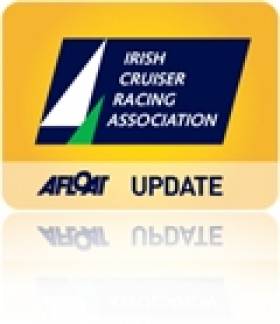Displaying items by tag: cruiserracer
#icra – A fleet of 40 boats with some high calibre entries are entered so far for the ICRA National Championships at Tralee Bay Sailing Club in June.
This year organisers says there is equal focus on IRC and ECHO handicaps in the National Championships with equal trophies prizes and recognition together with the ICRA Corinthian Cups for the Non-Spinnaker Divisions means that all Club sailors are catered for say organisers.
Division 2 is already shaping up to be a great fleet with the Corby 25 Tribal (ex Yanks and Franks), Liam Burke from Galway Bay entered and Dave Cullen's Half-Tonner King One from Howth Yacht Club. Nigel Biggs' Half-Tonner Checkmate XV from Dun Laoghaire's Royal St George is also in. There are also expected entries from skippers Frank Desmond, Peter Deasy and Mark Ivor's Cork Week winning Bad Company from the Royal Cork and Martin Reilly's Half-Tonner Harmony from Sligo Yacht Club.
Division 3 already has two hot quarter tonners Diarmuid Foley's Anchor Challenge from the Royal Cork and Lostys Illes Pitituses from Cobh Sailing Club as well as the defending champion Tiger (Neil Kenefick).
Division 1 is also building with likes of Raptor Denis Hewitt and partners and Joker 2 John Maybury both from the Royal Irish Yacht Club and Exhale Derry Good from Royal Cork Yacht Club leading the charge.
Division 0 sees ICRA Commodore Norbert Reilly's Crazy Horse Howth Yacht Club lining up against Anthony O' Leary's Royal Cork Antix who will be using the Dun Laoghaire to Dingle race as a feeder. Gloves Off skippered by Kieran Twomey and Conor Phelan's Jump will also be likely to travel from Royal Cork.
The ICRA Corinthian Cup will be sailed for non spinnaker classes at the same time and is expected to draw significant interest.
As before in Tralee, WIORA West Coast Championships is 'intertwined' with the ICRA's and starts a day earlier on 12th finishing on the 14 th as an extra bonus for all those who travel.
The facilities of Fenit Harbour including marina berths for the duration of the event together with inexpensive lift in and out are a bonus for ICRA. TBSC promise a carnival atmosphere in the club and throughout the village with pubs and restaurants doing their bit to make sailors welcome.
Entry discount applies before 27th April 2013 so don't delay - get your entry in now at www.traleesailingclub.com





























































